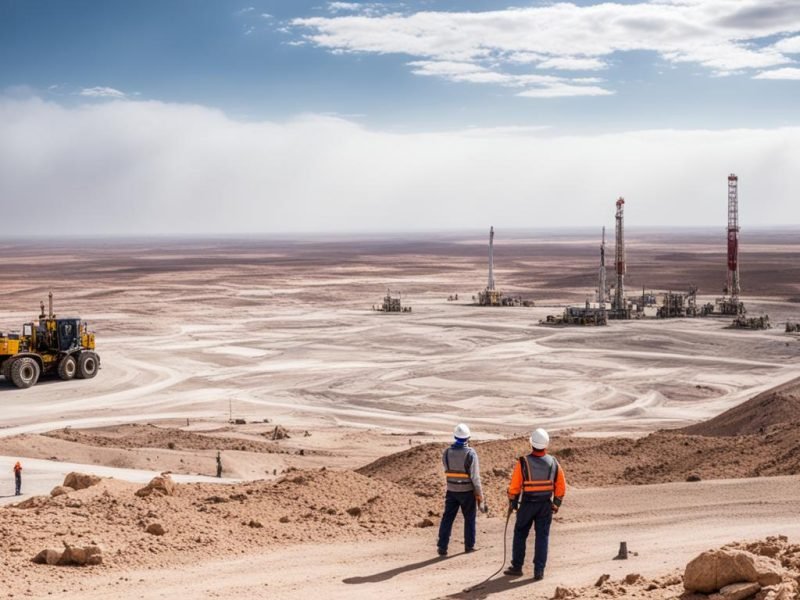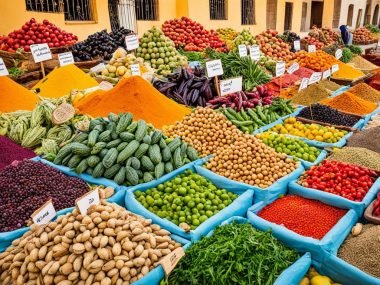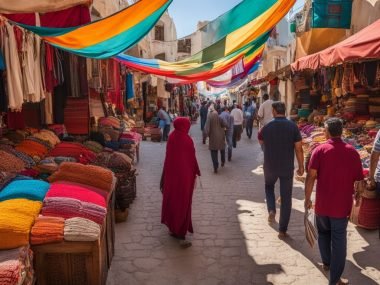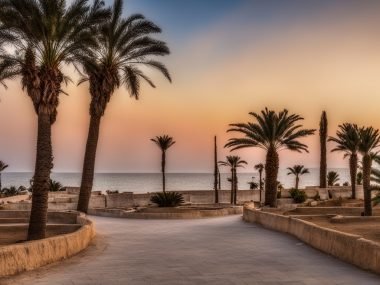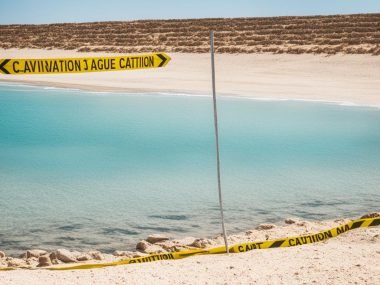Do you ever think of Tunisia as an oil-rich country? It might be a surprise, but Tunisia has 425 million barrels of oil. That’s as of 2016, making it 49th in the world. But, its oil use was 97,000 barrels a day, while it only made 41,634 barrels daily. This makes us wonder about the future of Tunisia’s oil.
Key Takeaways
- Tunisia holds 425 million barrels of proven oil reserves.
- The country ranks 49th globally in terms of oil reserves.
- Tunisia’s oil consumption far exceeds its production rate.
- The current oil reserves are sufficient for about 12 years.
- There exists a notable deficit between oil production and consumption.
With these numbers in mind, we look closer at Tunisia’s energy situation. We’ll check out its oil reserves and what it means for the future. Keep reading as we dive into Tunisia’s oil story.
Tunisia’s Oil Reserves
Tunisia is big in the oil world, especially in North Africa. It has lots of oil, which makes it important globally. Understanding its oil amount and how fast it uses oil is key.
Global Rank and Proven Reserves
In 2016, Tunisia was 49th in the world for oil reserves. It had about 425 million barrels. Even though it’s smaller, it’s still important in North African oil production. These reserves help Tunisia stay important in the energy world.
Quantity and Consumption Rate
Tunisia’s oil reserves are big compared to how much oil it uses. It uses 97,000 barrels of oil each day. So, its oil can last about 12 years if it keeps using oil at this rate.
Looking at oil use versus reserves in numbers helps us understand better:
| Measure | Value |
|---|---|
| Global Rank | 49th |
| Proven Reserves | 425 million barrels |
| Daily Oil Consumption | 97,000 barrels |
| Annual Consumption | 35.4 million barrels |
| Reserve Life | 12 years |
Tunisia’s oil reserves are very important for the country’s energy. They need to keep an eye on production, reserves, and use. This will make sure they have energy stability.
Oil Production in Tunisia
Tunisia started producing oil in 1966. Since then, there have been ups and downs in production. Now, let’s look at how much oil Tunisia makes each year and its oil history.
Annual Production Rates
In 2022, Tunisia made about 35.4 thousand barrels of oil every day. This ranks Tunisia 68th in the world for oil production. Even though it doesn’t make a lot of oil, this industry is still important for Tunisia’s economy and energy needs.
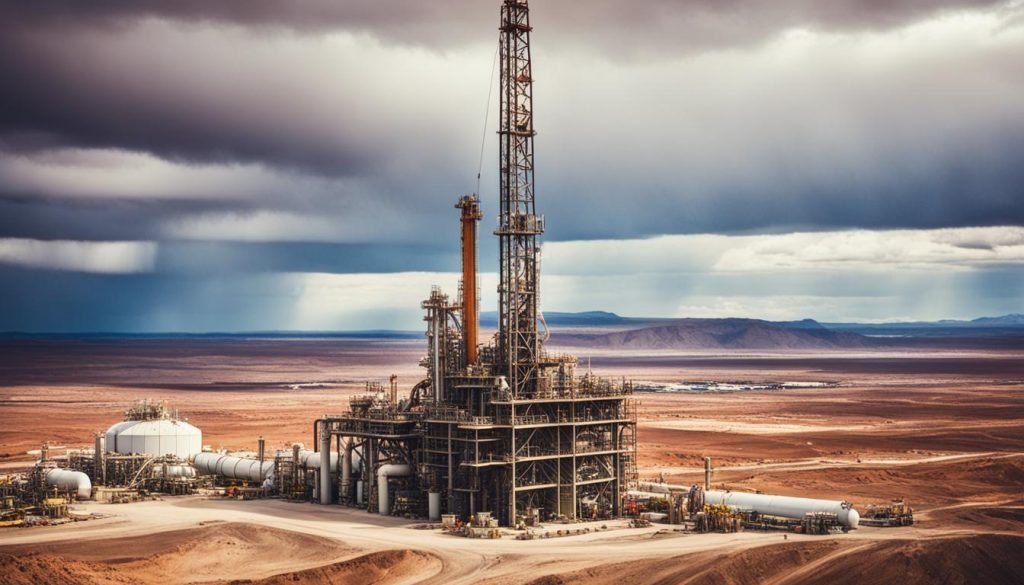
Historical Context of Oil Production
Oil making in Tunisia saw a big boost starting in 1966. The 1980s were the golden years of oil production. But, there has been less oil made since then. By the 2000s, Tunisia began importing more oil than it produced.
The story of oil in Tunisia shows common challenges in the oil world. Despite the fall in production, Tunisia’s past in oil still impacts its energy rules and economy today.
Tunisian Oil Industry
The oil industry in Tunisia is small globally but very important locally. It focuses on some key areas and has what it needs to handle making and refining oil.
Key Players and Companies Involved
In Tunisia, some major players are very important for oil. ETAP (Entreprise Tunisienne d’Activités Pétrolières), owned by the state, leads in handling the oil setup. Companies from other countries, like ENI and OMV, also help a lot. They bring skills and money. Together with the government, they help keep oil flowing and look for more.
Infrastructure and Facilities
Tunisia’s oil setup is in a few important places. It has one oil refinery in Bizerte. This place turns the crude oil Tunisia gets into usable products. Big oil fields like El Borma and offshore ones like Ashtart are key for getting oil.
Tunisia also has big gas fields in the sea, like Miskar and Hasdrubal. Even though they are making less now, they are still key for energy. A new field, Zarat, might boost Tunisia’s oil and gas production soon.
Oil Exploration in Tunisia
Oil exploration in Tunisia is key for the country’s energy and economy. It blends old and new exploring ways. This shows Tunisia’s effort to use what it has and look for new chances.
Locations and Methods
Tunisia has several important spots for oil exploration. The Zarat deposit is one such place. It has used old ways for finding oil for many years. Now, it’s looking at new energy sources like nuclear power with France and Russia.
This mix of old and new seeks to make things better and grow its energy options.
Recent Developments and Discoveries
New oil finds in Tunisia have sparked more interest. The Zarat deposit is expected to start working in 2020. This shows Tunisia’s plan to increase oil output.
Using both tried and new ways, the country wants a steady and varied energy future.
The Impact of Oil on Tunisia’s Economy
Tunisia’s economy and oil are deeply connected. This affects the nation’s money matters greatly. Let’s explore how these elements play out.
Trade and Export Data
In 2016, oil was a big part of Tunisia’s economy. The country sold more oil than it bought. This shows us how important oil is for Tunisia. The Bizerte refinery is key in this. It helps with both using the oil in Tunisia and selling it to other countries. By looking at oil trade, we can understand Tunisia’s economic health better.
Economic Dependency on Oil
Tunisia relies a lot on oil and gas. This is especially true for making electricity. About 70% of its gas goes to this use. The goal to cut down on carbon by 13% by 2030 is tough. But it shows how crucial oil is to the country’s economy and its future.
Future Prospects and Challenges
Tunisia’s oil industry’s future is tied to its renewable energy goals. The government plans to get 30% of electricity from renewable sources by 2030. This marks a big change from relying on oil.
- Renewable Energy Integration: Increasing investment in solar and wind energy projects.
- Energy Sector Diversification: Embracing new technologies and reducing carbon footprints.
- Economic Transition: Creating sustainable jobs in the renewable sector to maintain economic stability.
But, shifting focus isn’t easy. A big challenge for Tunisia’s oil sector is managing this change while keeping current oil setups running. This needs careful planning and good policies.
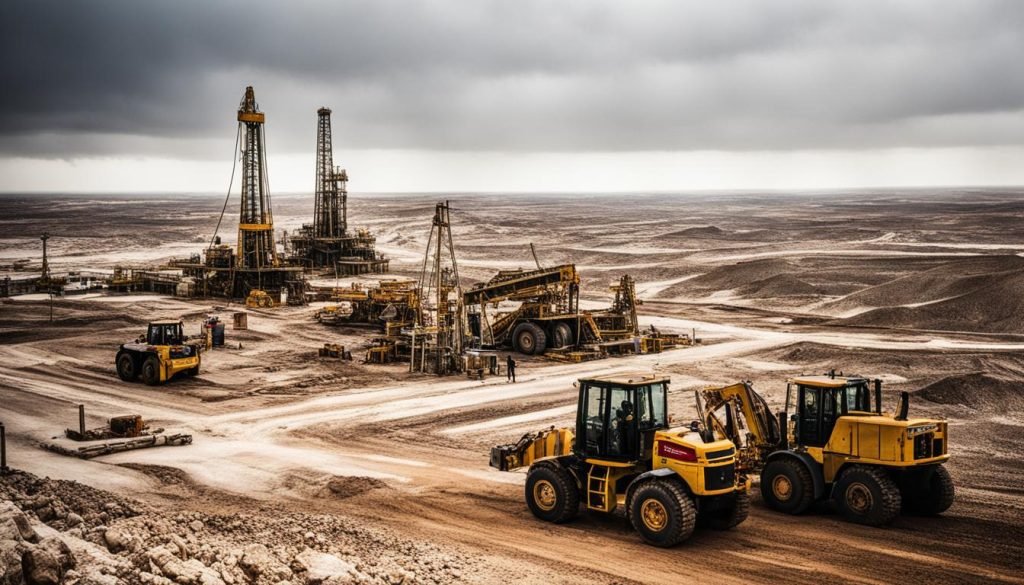
For a deeper look, here are some factors that influence Tunisia’s oil industry’s future:
| Factor | Impact | Notes |
|---|---|---|
| Government Policy | High | Support for renewable projects and regulations |
| Investment in Renewables | Moderate | Increased funding and incentives for green energy |
| Oil Market Volatility | High | Fluctuating oil prices affecting economic stability |
| Technological Advances | Moderate | Innovations in exploration and renewable energy technology |
| Public Awareness and Education | Low | Initiatives to educate communities about energy diversification |
Conclusion
Tunisia’s oil sector is at a crossroads with both chances and challenges. It has 425 million barrels in proven reserves. But, its oil production is dropping. This calls for new, sustainable solutions.
The country aims to diversify its energy sources. It is now turning to renewable energy. This effort will help meet energy needs and reduce the carbon footprint. It sets Tunisia on a path to play a bigger role in global energy shifts.
There’s a hopeful view for Tunisia’s energy future. With investments in green energy and new exploration methods, Tunisia could change its energy scene. The journey may be tough, but a smart plan can lead to a brighter, sustainable energy future.

